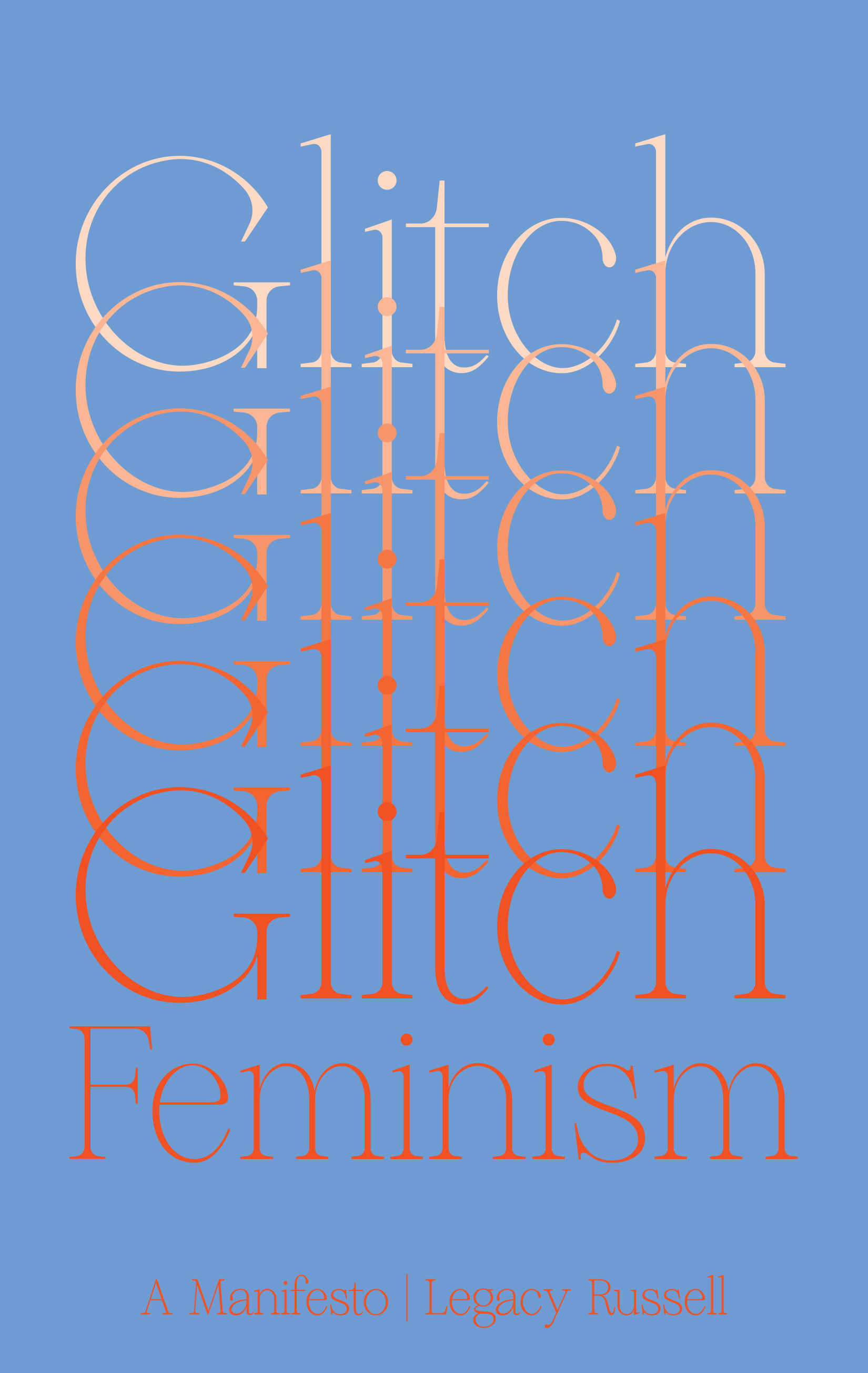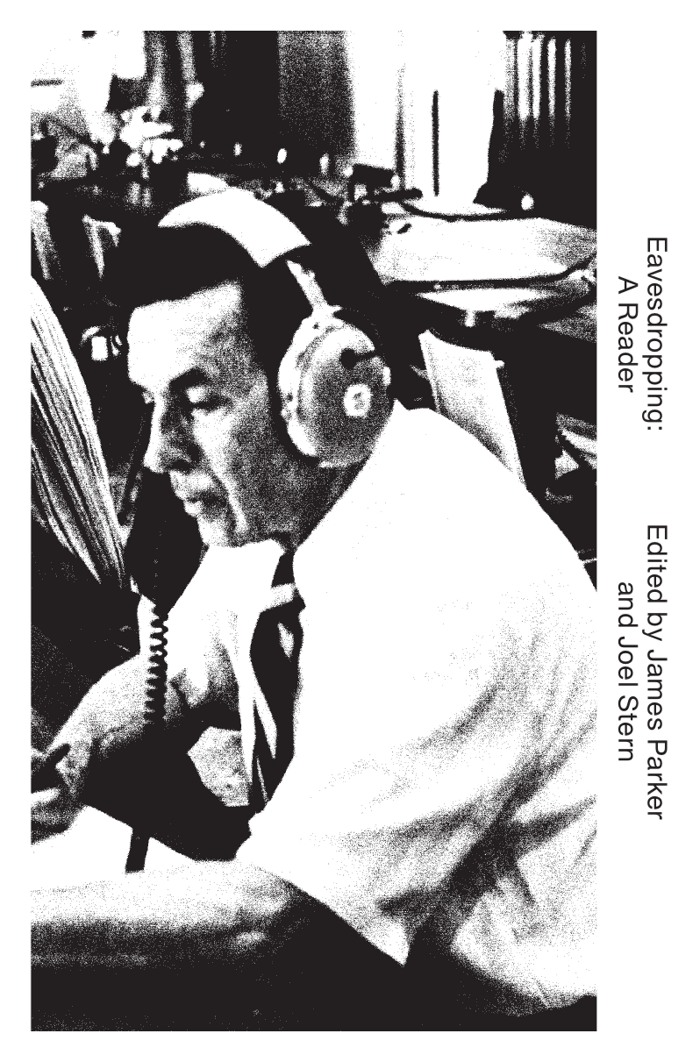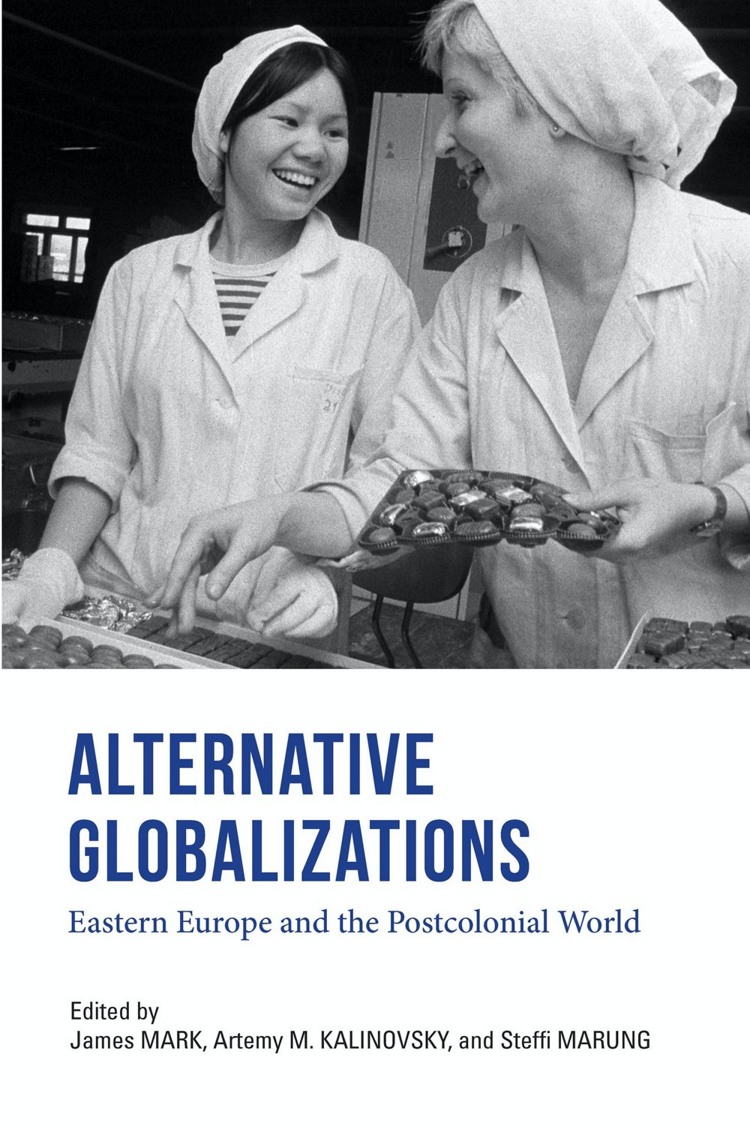Legacy Russell: Glitch Feminism: A Manifesto (2020)
Filed under book | Tags: · body, cyberfeminism, feminism, gender, glitch, internet, race, technology, women

“Simone de Beauvoir said, “One is not born, but rather becomes, a woman.” The glitch announces: One is not born, but rather becomes, a body.
The divide between the digital and the real world no longer exists: we are connected all the time. What must we do to work out who we are, and where we belong? How do we find the space to grow, unite and confront the systems of oppression? This conflict can be found in the fissures between the body, gender and identity. Too often, the glitch is considered a mistake, a faulty overlaying, a bug in the system; in contrast, Russell compels us to find liberation here. In a radical call to arms, Legacy Russell argues that we need to embrace the glitch in order to break down the binaries and limitations that define gender, race, sexuality.
Glitch Feminism is a vital new chapter in cyberfeminism, one that explores the relationship between gender, technology and identity. In an urgent manifesto, Russell reveals the many ways that the glitch performs and transforms: how it refuses, throws shade, ghosts, encrypt, mobilises and survives. Developing the argument through memoir, art and critical theory, Russell also looks at the work of contemporary artists who travel through the glitch in their work. Timely and provocative, Glitch Feminism shows how an error can be a revolution.”
Publisher Verso, London, September 2020
ISBN 9781786632661, 1786632667
176 pages
Reviews: Rahel Aima (Bookforum, 2020), R.V. Campbell (The White Review, 2020), Johanna Marie Engemann (re:visions, 2020, DE), Ondřej Trhoň (Revue Prostor, 2020, CZ), Pauline Nguyen (Femme Art Review, 2021), Miranda Findlay (Feminist Formations, 2021), O.K. Keyes (Studies in Art Education, 2021), Hannah Curran-Troop & Annelot Prins (Eur J Cult Stud, 2022), Zoe Hurley (Postdigital Sci & Edu, 2023), Ondřej Trhoň (Artalk.cz, 2023, CZ).
Interviews with author: Mikkel Rosengaard (Bookforum, 2020), Ben Davis (artnet, 2020), ATM (2020), William Kherbek (Berlin Art Link, 2020).
PDF (updated on 2023-10-23)
Comment (0)James Parker, Joel Stern (eds.): Eavesdropping: A Reader (2019)
Filed under book | Tags: · law, listening, sound, sound art, sound studies, surveillance

“Eavesdropping: A Reader addresses the capture and control of our sonic world by state and corporate interests, alongside strategies of resistance. For editors James Parker (Melbourne Law School) and Joel Stern (Liquid Architecture), eavesdropping isn’t necessarily malicious. We cannot help but hear too much, more than we mean to. Eavesdropping is a condition of social life. And the question is not whether to eavesdrop, therefore, but how.”
Featuring contributions from James Parker, Joel Stern, Norie Neumark, Lawrence Abu Hamdan, Susan Schuppli, Sean Dockray, Joel Spring, Fayen d’Evie and Jen Bervin, Samson Young, Manus Recording Project Collective.
Publisher City Gallery Wellington, Wellington, with Liquid Architecture, Melbourne, and Melbourne Law School, Melbourne, 2019
Open access
ISBN 9780995128606, 099512860X
223 pages
Review: Kristen Gallerneaux (The Wire, 2020).
Exh. reviews: Norie Neumark (Art+Australia, 2018), Sophie Knezic (MeMO, 2018).
Project website
Exhibition (2018)
Exhibition (2019)
Publisher
WorldCat
James Mark, Artemy Kalinovsky, Steffi Marung (eds.): Alternative Globalizations: Eastern Europe and the Postcolonial World (2020)
Filed under book | Tags: · central europe, china, cold war, decolonization, eastern europe, economy, global south, globalisation, history, internationalism, labour, migration, nationalism, politics, postcolonialism, race, racism, socialism, solidarity, southeastern europe, soviet union

“Globalization has become synonymous with the seemingly unfettered spread of capitalist multinationals, but this focus on the West and western economies ignores the wide variety of globalizing projects that sprang up in the socialist world as a consequence of the end of the European empires. This collection is the first to explore alternative forms of globalization across the socialist world during the Cold War. Gathering the work of established and upcoming scholars of the Soviet Union, Eastern Europe, and China, Alternative Globalizations addresses the new relationships and interconnections which emerged between a decolonizing world in the postwar period and an increasingly internationalist eastern bloc after the death of Stalin. In many cases, the legacies of these former globalizing impulses from the socialist world still exist today. Divided into four sections, the works gathered examine the economic, political, developmental, and cultural aspects of this exchange. In doing so, the authors break new ground in exploring this understudied history of globalization and provide a multifaceted study of an increasing postwar interconnectedness across a socialist world.”
Publisher Indiana University Press, Bloomington, 2020
ISBN 9780253046505, 0253046505
vii+341 pages
Reviews: Jelena Đureinović (Studies of Transition States and Societies, 2020), Markus Sattler (Eurasian Geography and Economics, 2020), Ondřej Bělíček (A2larm, 2020, CZ).
Interviews with co-author (James Mark): Zoltán Ginelli (LeftEast, 2020, Part 2, Part 3).
Project website
Publisher
WorldCat
PDF (7 MB)
Comment (0)
